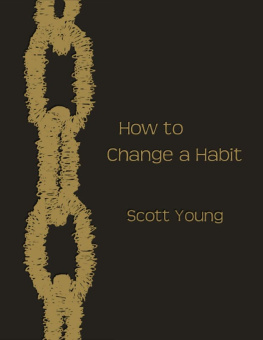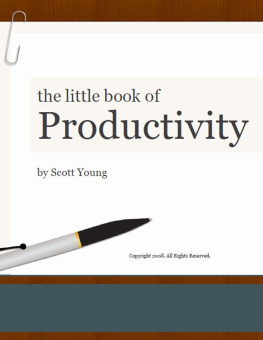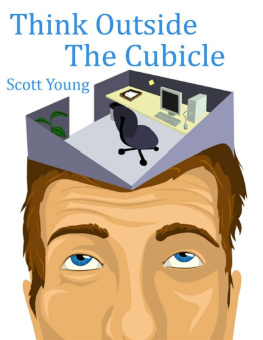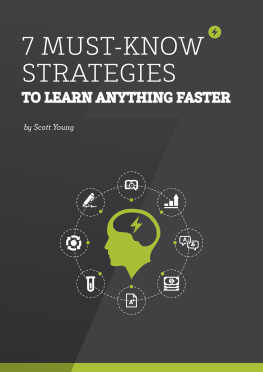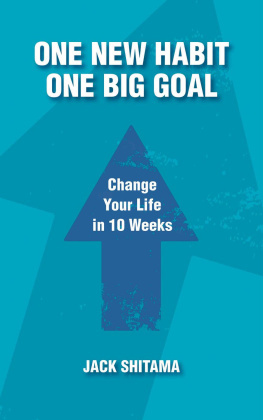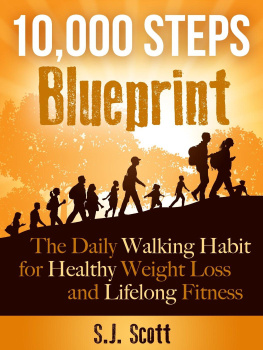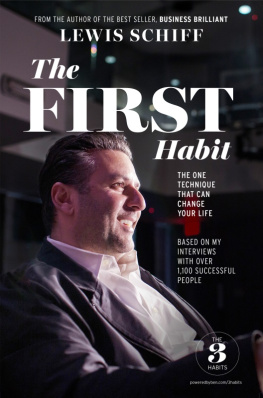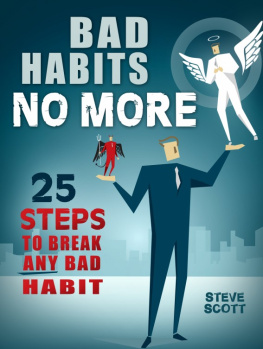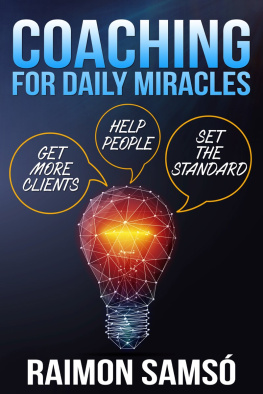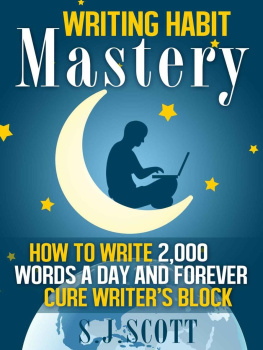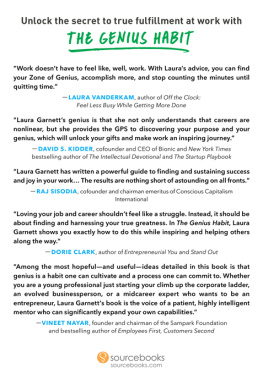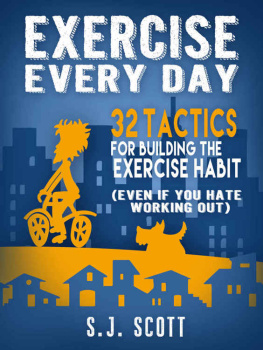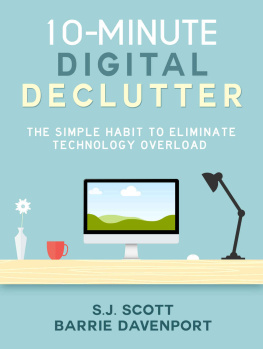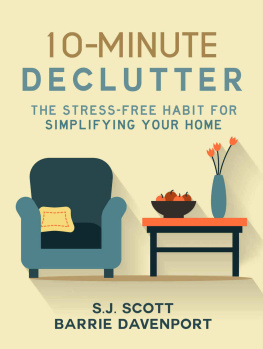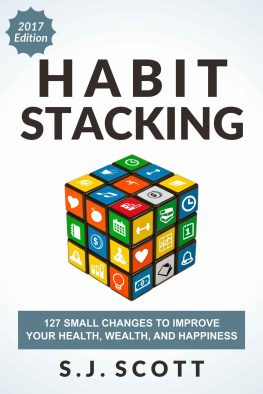Scott Young - How to Change a Habit
Here you can read online Scott Young - How to Change a Habit full text of the book (entire story) in english for free. Download pdf and epub, get meaning, cover and reviews about this ebook. year: 2011, genre: Romance novel. Description of the work, (preface) as well as reviews are available. Best literature library LitArk.com created for fans of good reading and offers a wide selection of genres:
Romance novel
Science fiction
Adventure
Detective
Science
History
Home and family
Prose
Art
Politics
Computer
Non-fiction
Religion
Business
Children
Humor
Choose a favorite category and find really read worthwhile books. Enjoy immersion in the world of imagination, feel the emotions of the characters or learn something new for yourself, make an fascinating discovery.
- Book:How to Change a Habit
- Author:
- Genre:
- Year:2011
- Rating:3 / 5
- Favourites:Add to favourites
- Your mark:
- 60
- 1
- 2
- 3
- 4
- 5
How to Change a Habit: summary, description and annotation
We offer to read an annotation, description, summary or preface (depends on what the author of the book "How to Change a Habit" wrote himself). If you haven't found the necessary information about the book — write in the comments, we will try to find it.
How to Change a Habit — read online for free the complete book (whole text) full work
Below is the text of the book, divided by pages. System saving the place of the last page read, allows you to conveniently read the book "How to Change a Habit" online for free, without having to search again every time where you left off. Put a bookmark, and you can go to the page where you finished reading at any time.
Font size:
Interval:
Bookmark:

Table of Contents
We are what we repeatedly do. Excellence then, is not an act, but a habit. - Aristotle
Do you have a habit you want to change? Maybe you want to quit smoking, stop eating unhealthy foods or turn around negative thoughts. Do you have a habit you want to create? Maybe you want to exercise more, stick to a new diet, work more productively, become friendlier or just enjoy life more.
Whether you want to remove a bad habit or create a good one, this e-book will give you the means to achieving it. To most people changing a habit is a tremendous struggle. Spending years building up to a change and going through repeated failures before something sticks seems fairly common. Im here to say that changing habits is nothing more than a skill, like riding a bicycle, and with the right information and training it is a skill anyone can develop.
I created this e-book, not to be read in one sitting and then forgotten, but to serve as a handbook for making changes. Many of the concepts Ill talk about in this book are unnecessary for someone who is just beginning to make changes. Triggers, operant conditioning and stability points are useful to understand but arent necessary to start making the changes you want.
While reading this book, Ill start by giving you the information you need to start changing habits right away. So if youve been struggling with a goal, whether it is losing weight, keeping a budget or improving your self talk, Ill start by giving you the basic tools you need to make the change.
From that point Ill discuss more advanced techniques for changing habits. These tools will work when basic methods fail. These advanced techniques will also allow you to look at your habits in a new light. Instead of seeing obvious needs for improvement, you can start to experiment with new ways of living and thinking.
Remember first that habit changing is a skill. You probably couldnt play the piano without any practice or instruction. Similarly, dont make unreasonable expectations for your ability to change habits without having any practice or instruction. Instead try to use this book as a guide to give you more options and a better understanding.
If youve struggled with changing behaviors before, dont be so quick to blame your willpower or motivation. Without an understanding of how habits actually work, most of the time a habit fails will be due to a poor strategy rather than a lack of willpower. Discipline is necessary, but for every drop of discipline a gallon of strategy and understanding goes into creating a change in habits. Not having enough discipline is almost never the biggest limit to your success.
Who am I and why should you be listening to my advice? I dont have a doctorate and I havent served as a personal coach to the worlds elite. Nor is my story a captivating tale of overcoming oppression, addiction or laziness. My story is a rather common one and my knowledge of changing habits have come from a good dose of research and a lot of personal experimentation.
It began several years ago when I was guided by my routine. Most of my attempts to change behavior fell flat. I would try to exercise more and end up staying home to watch television. I would try to read more and not pick up a book in weeks. I wasnt hanging over a cliff, but I certainly wasnt reaching the bridge to success anytime soon. In short, I was like most people, governed by habits I didnt really know I had and limited in my capacity to change.
It was around this time that I started stumbling across information for how to change behavior. Not just guides on how to break a single habit, like eating better or following a budget, but a different philosophy on changing habits themselves.
Instead of changing your behavior, as a tremendous struggle that should only be used in the most painful situations, this philosophy treated habit change like some people treat interior design. Rather than a painful struggle, you could change behaviors like you change fashions in your room, changing on a whim just to see what it would feel like.
After discovering this philosophy, I started changing my habits. Becoming a vegetarian, giving up television, waking up early, exercising daily, cutting out junk food, reducing internet usage, reading more and changing my patterns of thinking are only a few of the habits Ive altered over the past few years. Although I discontinued some of them, those decisions were conscious choices, not breaks in willpower.
Today I feel comfortable in my ability to change almost any behavior I have, either permanently or as a temporary experiment. Ive built the skill of changing habits enough that instead of making it a chore it has become a joy. I love the idea of trying a new way of living, habit changes are now a personal challenge and an adventure.
Although I base most of my information from this e-book on personal experiments, I certainly have my own idiosyncrasies. This means that I back up most of my ideas and insights from others sources. Along with experimentation, Ive done a lot of research in this area, so many of these major concepts Ive found to be backed up by psychological research and the experience of many world experts and therapists.
Will this work for you?
I can understand a little skepticism. If I had read these words several years ago, I probably would have thought the person writing them was a highly organized robot, having a natural sense of discipline and order that would make it impossible for me to follow.
I want to make it very clear, that my ability to change habits hasnt come from an innate sense of order, support from the people around me or a lot of willpower. Before I learned how to change habits I was comfortable living in a
state of almost complete disorder and mess. Many of the habit changes I made were met with apathy to complete resistance from friends and family, so I didnt have a cheer leading team pushing me forward. Before I built this ability, I wasnt disciplined. I always looked for ways to get out of doing work and the projects I did start, I rarely finished. Hopping between whims, I had trouble committing myself to work on the things that I was completely motivated by.
You dont need to create an obsession for changing habits to make this work for you. The basic concepts in this book are more than enough to change 90% of the behaviors you want to. You may become interested as you build up skill in this art, but you can use the ideas in this book to change one habit just as you can to change twenty.
What about fun and spontaneity?
Changing habits doesnt have to make you a robot that can never do anything outside its programming. You can have order and fun. Realize that you already have habits, you just arent aware of them. How you go to work, what you eat and how you behave are already guided by a long list of habits. The ability to change your habits simply means that you are in the drivers seat. You get to decide what habits to install instead of letting your habits rule you. Habit changes can often lead to more fun and spontaneity. When you free up the time, energy and money being sucked away by your ineffective habits, you suddenly have a lot more resources. After a few months of changing habits I noticed that I had several times the capacity to enjoy and work than I had before.
Habit changes can be used to eliminate and restrict, but they can also be used to enhance what you already have.
When I was a kid I used to walk to school. Living in the northern parts of Canada, we received a lot of snow. I can remember that after a big snowfall, many of the shortcuts kids took to school were filled in with a thick blanket of snow.
Next pageFont size:
Interval:
Bookmark:
Similar books «How to Change a Habit»
Look at similar books to How to Change a Habit. We have selected literature similar in name and meaning in the hope of providing readers with more options to find new, interesting, not yet read works.
Discussion, reviews of the book How to Change a Habit and just readers' own opinions. Leave your comments, write what you think about the work, its meaning or the main characters. Specify what exactly you liked and what you didn't like, and why you think so.

